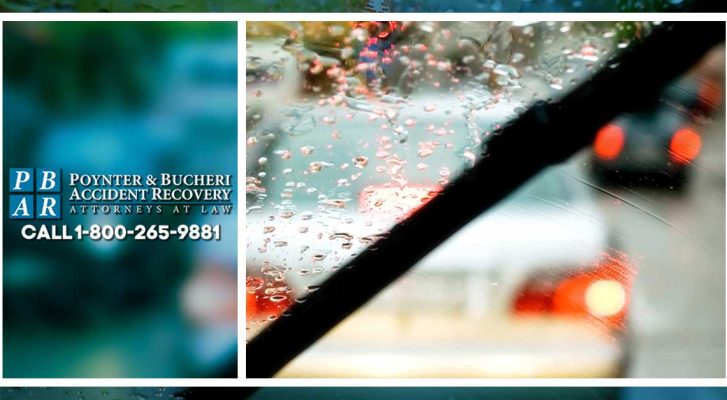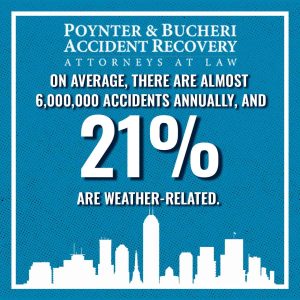
Car Accident in the Rain: What Should I Do?

Most people understand how claims work when they are in an accident with another driver who was at fault. But what about single-car accidents where only one driver is involved? And what if that accident happened due to bad weather, such as rainfall?
Are you automatically at fault? Can you blame the rain for your accident?
Our Indianapolis car accident lawyers answer these questions and more below. If you still have questions after reading and need help with a car accident claim, don’t hesitate to reach out for assistance.
Single-Car Accidents Due to Weather Conditions

Weather-related car accident statistics show that single car accidents due to weather happen quite often and can be very dangerous. On average, there are almost 6,000,000 accidents annually, and 21% are weather-related.
Furthermore, weather-related vehicle accidents kill more people each year than large-scale weather disasters like tornadoes or hurricanes.
Of course, weather-related accidents can refer to any kind of weather, such as snow, ice, or even fog. However, the Department of Transportation reports that most weather-related crashes happen due to wet pavement from rainfall.
How Do Single-Car Accidents in the Rain Happen?
A single-car accident simply means that the accident only involves one driver and their vehicle. While accidents due to rain can certainly involve other cars, more often than not, individual drivers get into accidents on their own during bad weather.
So if only one driver is involved, how do these accidents happen?
There are many reasons why a person might get into a car accident in the rain, which can include:
- Speeding
- Hydroplaning
- Distracted driving
- Failing to use windshield wipers or having broken windshield wipers
- Low visibility and not being able to see
- Failing to use headlights to see better
- Driving with worn tires
How to Avoid Car Accidents in the Rain
In many cases, a car accident in the rain can be avoided with better driving behaviors. Try the following weather-related driving safety tips to avoid these kinds of accidents:
- Slow down and maintain a larger distance between you and other cars in front of you.
- Do not make sudden movements with the steering wheel.
- Do not brake suddenly. Instead, slowly ease down on the brakes when you need to slow down or stop.
- Use your headlights and windshield wipers to increase visibility.
- Pay close attention to pedestrians or wildlife that might be harder to see in the rain.
- Avoid driving through deep puddles or moving water.
- Keep your tires maintained.
- If you cannot see, pull over somewhere safe and wait until the rain stops or slows down.
Who is Liable for Car Accidents Due to Rain?
Indiana is a modified comparative fault state, which means if you are 51% or more at fault for an accident, you cannot recover compensation for your damages. Unfortunately, most single-car weather-related accidents are the fault of the individual driver.
For example, many drivers who get into an accident while it’s raining do so because they are driving faster than they should be, considering the road conditions. Another defense could be that you simply shouldn’t have been driving in the first place, or you should have pulled over if you couldn’t see.
However, there are rare occasions where it is possible for the driver to not be at fault when they get into an accident in the rain. For example, if your brakes fail when you try to stop on wet pavement, you could potentially hold the repair shop or the car manufacturer responsible. But this is only possible if the brake failure was genuinely caused by an error made during maintenance or if the manufacturer knew about a default with the brakes.
Defective tires are another instance where you could hold the tire manufacturer or the shop that installed the tires responsible. But if the tires were worn out and you failed to replace them on time, this would be considered your fault.
There are also very rare cases where a driver can use the “Act-of-God” defense, but this can only be used in highly unusual and unexpected situations. For example, if lightning strikes your car and this causes you to swerve in the rain and get into an accident, you could claim that this very unexpected and unavoidable situation caused the crash.
No matter the situation, your best chances of winning your case and recovering compensation are if you work with a lawyer. It is difficult to blame the weather or another party for a single-car accident in the rain. Thus, you will need the help of a lawyer to gather evidence and build a strong case that proves you were not to blame.
What Should I Do If I’ve Been In a Car Accident in the Rain?
Your safety should always be your number one priority after an accident. If you crash in the rain, pull over to a safe area if possible and call 911. If you are injured, make sure you tell the police so they can send emergency medical responders to help.
If possible, and if it will not put you in danger, you can take photos or videos of the accident to show what happened. This kind of evidence could help you if you intend to file a claim to have the damages or your injuries covered by insurance.
You should also keep any copies of medical documents, bills, or invoices you receive after you are treated for your injuries. Once your injuries have been addressed, make sure you file a claim with your insurance company.
If you believe you are not at fault for the accident or if your insurance company is not paying you what you are owed for the damages you suffered, get in contact with a lawyer. An attorney can review your case and offer you guidance. They can also protect your rights and help you prove liability if another party is to blame. Additionally, they can handle communications with your insurance company or an insurance company involved to ensure you are fairly compensated.
Consult With an Indianapolis Personal Injury Attorney
At Poynter & Bucheri Accident Recovery, we handle a wide range of accident cases, including those involving single-car accidents in the rain. If you need compensation to help cover the damages you have suffered, our team can help.
Don’t hesitate — one of our experienced attorneys can assist you right away. Call 1-800-265-9881 for a free case review.
